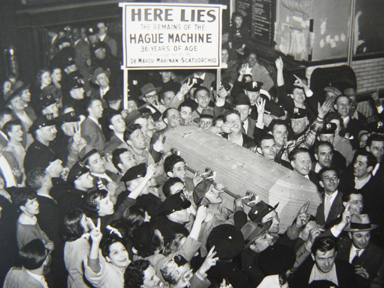Frank Hague was 73 years old on May 10, 1949. Even though he had retired two years earlier from his 30-year job as mayor of Jersey City, Hague still had a stake in the mayor’s race that night, as he was putting up his handpicked successor, his nephew Frank Hague Eggers, for the seat.
During Frank Hague’s own reign, he had ascended from just another young turk who learned his political craft in the saloons of downtown Jersey City to the most powerful Democratic boss on the East Coast.
Now, that era was ending. On the night of May 10, Eggers was upset by Hague’s former right-hand man, John V. Kenny, and his Freedom Ticket. Eggers lost by 22,000 votes.
That night, according to a book by renowed historian and Jersey City native Thomas Fleming: “Downtown, a mob of Freedom Ticket Voters snake-danced through the streets, carrying a coffin labeled ‘The Hague Machine.’ Kenny and several lieutenants stormed into City Hall, hoping to seize incriminating documents. But the Organization had known for hours that the election was lost, and the invaders found nothing but charred scraps of paper in the furnace room.”
“I asked my father about what was happening and he told me there was a big change.” – Charles Balcer
________
“Men and women came from all directions with real torch lights as they carried the coffin toward City Hall,” Balcer said. “I asked my father about what was happening, and he told me there was a big change.”
On the eve of another mayoral election 60 years later, Jersey City residents who either witnessed or grew up hearing the stories looked back at the seminal event.
How political succession led to success
The electoral defeat of 1949 had its roots in Hague’s 1947 retirement, when he stepped aside to enjoy more of his time outside Jersey City and the millions of dollars he reportedly earned in office – quite a feat on an $8,500 annual salary.
Hague still maintained what he thought was a firm grip over his hometown. He chose Eggers to replace him as mayor, with longtime confidant Johnny “Needle Nose” Malone along as deputy mayor to help guide Eggers.
But that stopped Kenny from gaining what he believed he had earned: the mayor’s chair in City Hall.
Thomas Fleming, in an interview last week, said resentment against Hague was building amongst the people. Fleming was 22 at the time and living at home, the son of Hague supporter and Hudson County Sheriff Teddy Fleming.
“Hague was considered God, but there was a great deal of resentment for Hague by people who thought he was growing too arrogant,” Fleming said. “They saw that he lost touch with his constituents, and basically he was not running the city anymore.”
One of those constituents was Al Rinn, a 31-year old police officer only a few years removed from service in World War II. Today, Rinn is still working at the age of 91 as an investigator for the state of New Jersey. He supported Kenny since Kenny was a family friend, but he recalled the moment he knew Kenny had a great chance of winning.
“There was a labor rally in Journal Square for Kenny during the election season,” Rinn said last week. “Once I saw the turnout, which was estimated at 20,000, I knew the election was over.”
Matthew Amato, a columnist for the Hudson Reporter, was only 2 years old at the time of the election. However, he remembers the stories of Hague from his father, Matthew Sr., and others who worked for the city under Hague. Amato also studied the 1949 election and has a theory on why Kenny prevailed.
“John V. Kenny’s ticket was multiracial. He was Irish Catholic but he ran a Protestant, an Italian, a Polish, and another Irish Catholic,” Amato said. “Hague ran all Irish Catholics. There’s the difference why Kenny was able to pull it out.”
Afterward
The election was a crushing blow to Hague, who tried to make a comeback in politics in the early 1950s but failed. He died on January 1, 1956 at the age of 79. Eggers died in 1954.
Amato also tells an apocryphal fable of Hague and Kenny meeting in a public bathhouse after the election was over.
“Hague asks Kenny, ‘Gee, why didn’t tell me you wanted to be mayor? You wanted this thing so bad, I would have given it to you,’ ” Amato said. “And Kenny tells him, ‘Well, it’s too late now.’ ”
Kenny tried to emulate Hague, but was not the same kind of hands-on micromanager, instead preferring to work behind the scenes. Ironically, Kenny – unlike his former mentor – went on to face criminal prosecution due to his political dealings.
Kenny was convicted in 1971 on extortion charges, and died in 1975 at the age of 81.
Ricardo Kaulessar can be reached at rkaulessar@hudsonrreporter.com.
